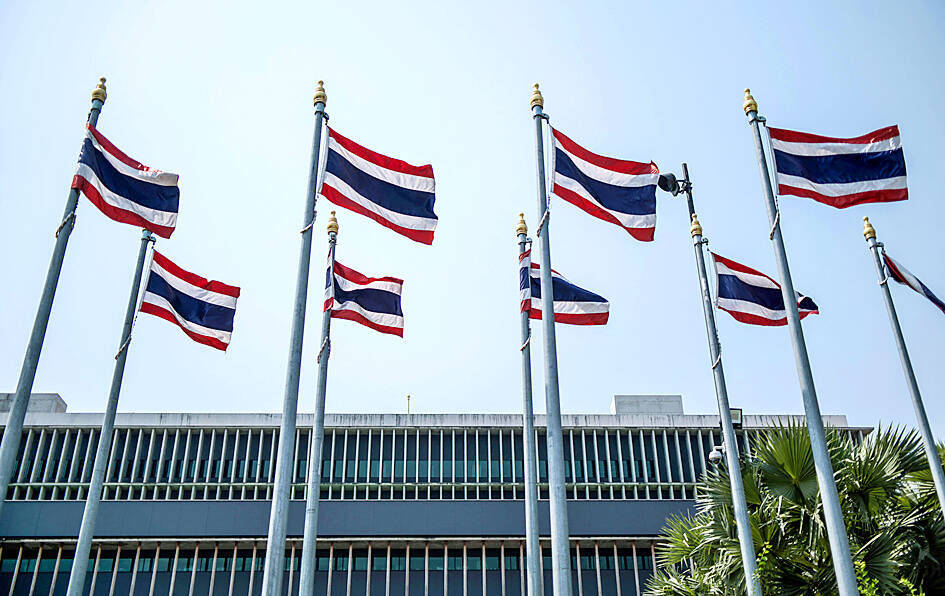A Taiwan-Thailand bilateral investment agreement (BIA) inked last month is expected to take effect later this year, following a review by the Executive Yuan (EY) and subsequent ratification by the Legislative Yuan, Executive Yuan officials said yesterday.
The ratification would mark Thailand as the fifth country to have signed a BIA with Taiwan since 2016, after the Philippines, India, Vietnam and Canada, they added.
Taiwan and Thailand have an existing BIA signed and promulgated in 1996, but the 28-year-old organ is insufficient for the diversity of modern investment and cannot keep up with international investment regulations, the Office of Trade Negotiations said.

Photo: AFP
The new BIA would make information more transparent, ensure a one-stop service, pledge government assistance in resolving investment disputes, establish joint investment committees, implement measures to safeguard Taiwanese businesspeople’s investments in third-party countries, attempt to balance the rights of investors and the host country, and create a set of investor-state dispute settlement rules, the office said.
The value of Taiwan-Thailand bilateral trade has increased from US$9.30 billion in 2016 to US$16.24 billion last year, it said, citing customs and investment data.
In the same time range, bilateral investment has grown 119.8 percent, from US$3.18 billion to US$69.9 billion, making Thailand Taiwan’s principal trading partner among ASEAN members.
Thai imports from Taiwan consist mainly of electronic equipment, machinery and other components, and are the top imports of Thailand, the office said.
Taiwan is Thailand’s second-largest importer of data processing machines, it added.
Delta Electronics Public Co, Kinpo Group subsidiary Cal-Comp Electronics, JPP Holding Co subsidiary Jinpao Precision Industry Co, UniPresident Group, Chunghwa Telecom and others have been cultivating business opportunities in Thailand, while CTBC Financial Holding has become the largest shareholder of Thailand’s LH Financial Group and has 72 branches in Thailand, the office said.
Large-scale investments in Thailand include investments in the printed circuit board industry, electronic components, automotive components, artificial intelligence and server-related opportunities, it said.

Chinese spouse and influencer Guan Guan’s (關關) residency permit has been revoked for repeatedly posting pro-China videos that threaten national security, the National Immigration Agency confirmed today. Guan Guan has said many controversial statements in her videos posted to Douyin (抖音), including “the red flag will soon be painted all over Taiwan” and “Taiwan is an inseparable part of China,” and expressing hope for expedited reunification. The agency last year received multiple reports alleging that Guan Guan had advocated for armed reunification. After verifying the reports, the agency last month issued a notice requiring her to appear and explain her actions. Guan

GIVE AND TAKE: Blood demand continues to rise each year, while fewer young donors are available due to the nation’s falling birthrate, a doctor said Blood donors can redeem points earned from donations to obtain limited edition Formosan black bear travel mugs, the Kaohsiung Blood Center said yesterday, as it announced a goal of stocking 20,000 units of blood prior to the Lunar New Year. The last month of the lunar year is National Blood Donation Month, when local centers seek to stockpile blood for use during the Lunar New Year holiday. The blood demand in southern Taiwan — including Tainan and Kaohsiung, as well as Chiayi, Pingtung, Penghu and Taitung counties — is about 2,000 units per day, the center said. The donation campaign aims to boost

The Kaohsiung Tourism Bureau audited six hotels in an effort to prevent price gouging ahead of Korean band BTS’ concert tour in the city scheduled for Nov. 19, 21 and 22 this year. The bureau on Friday said that the audits — conducted in response to allegations of unfair pricing posted on social media — found no wrongdoing. These establishments included the local branches of Chateau de Chine, Hotel Nikko, My Humble House, and Grand Hai Lai, it said, adding that the Consumer Protection Commission would have penalized price gougers had the accusations been substantiated. The bureau said the Tourism Development Act

The Central Weather Administration (CWA) said a magnitude 4.9 earthquake that struck off the coast of eastern Taiwan yesterday was an independent event and part of a stress-adjustment process. The earthquake occurred at 4:47pm, with its epicenter at sea about 45.4km south of Yilan County Hall at a depth of 5.9km, the CWA said. The quake's intensity, which gauges the actual effects of a temblor, was highest in several townships in Yilan and neighboring Hualien County, where it measured 4 on Taiwan's seven-tier intensity scale, the CWA said. Lin Po-yu (林柏佑), a division chief at the CWA's Seismological Center, told a news conference